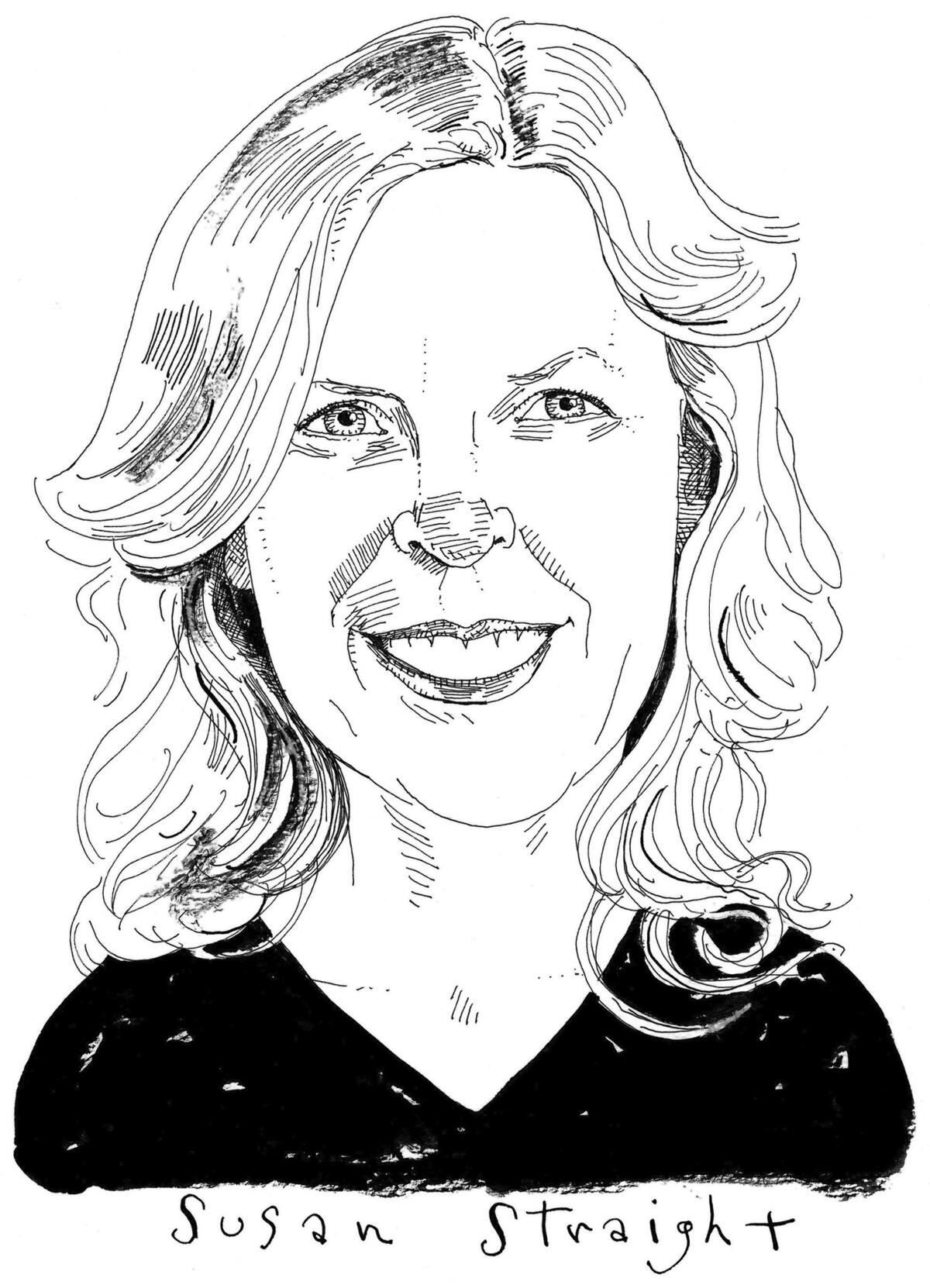Susan Straight on learning to write without a room of oneâs own

What does it take to be a writer: A room of oneâs own? A weakness for words? To celebrate the Festival of Books, we asked five celebrated authors to recall a turning point in their evolution as writers. First up is Susan Straight, recipient of the Los Angeles Times Book Prizesâ 2013 Robert Kirsch Award for lifetime achievement.
I wrote the stories in my first book by hand, in these places: at the counter of the Mobil station where I worked in 1979, between customers, eating beef jerky and stale cashews out of the nut mix no one ever bought from the cloudy glass compartments beneath my notebook; sitting on a huge rock at the beach in Rosarito, Mexico, in 1983 after my husband fell asleep in the tiny hotel where we spent our two-night honeymoon, writing in my notebook; sitting at a card table in married student housing in 1984 in Amherst with the small blue Smith-Corona my mother had given me for high school graduation; in a pale green 1980-something Fiat with brakes that went out all the time, upon which occasion my husband would have me sit in the driverâs seat and pump the brakes while he was underneath the car in the gravel driveway of our house back in Riverside in 1988, and I held a notebook and pen, writing.
I wrote my second book at night, after work, on the same Smith-Corona, sitting at the same flimsy brown card table in the back bedroom we had just painted baby pastels. I was pregnant. My husband worked graveyard shift. The floor where weâd pulled up old carpet was bare wood stained with motor oil â the previous owner had worked on engines in this, his bedroom.
I believed by then that real writers never wrote by hand â they typed. My husband claimed he couldnât sleep unless he heard the clacking of the keys against the hard black roller, and the zip-slide of the platen when I finished a line. When I went to wake him for work, sometimes he said, âI didnât hear anything. You said you were going to work.â Iâd say, âI was working. I was writing by hand.â âThatâs not the same,â heâd yawn, and head into the night.
FULL COVERAGE: Festival of Books
My brother wrecked the green Fiat. My husband and I bought a blue Toyota truck. I had two daughters then, and I wrote in the front bench seat, while people played all around me. Someone stole the truck â all we ever found was one axle in a dirt field.
I had a third daughter. I got divorced. I wrote in my green Mercury Villager van, with headlights that made it look like a shark at night, according to the girls who waited for me to pick them up from practice for everything children can practice for. For 24 years I wrote not while driving but while waiting in parking lots for hours â basketball and tennis and doctor appointments and hospitals, Girl Scouts and plays, driving exams and prom nights (2 a.m.! A whole chapter!), writing in my notebooks.
I have more than 100 legal pads filled with handwriting. Eight novels, two books for children, countless stories and essays.
The whole time, I waited to be alone. Writers were alone. They woke with the sunrise, drank coffee, wrote alone, thought alone, listened to music they chose, and in the evening drank something impressive while writing into the night. Alone. Real novelists, those we admire, those we consider timeless in their language and character and scene, those who receive accolades for inventive language and form, have writing lives we imagine in specific ways. I imagine these, even now, listening to writers being interviewed.
I joked all the time about writing in my car, about never having been to a writers colony but having finished my third and fourth novels in cheap motels where I stayed awake all night because in the first, someone was trying to kill his wife and she beat him up and he lay in the hallway moaning; in the second, two men were making drug deals all night long in the hallway; and finishing my fifth novel at Riversideâs elegant Mission Inn, in 1995, because I felt the weight of Erle Stanley Gardner and the other writers whoâd inhabited the lovely room where I wrote â by hand â feeling like a fraud.
And sometimes other writers would say to me, âWell, itâs easy for you to write anywhere, I mean, I couldnât do it, I have to have utter silence, and concentration, and Iâm working on different kinds of themes, I mean, my work is very serious.â Yep. People said that. I was writing then about a woman killed in an alley, because of jealousy and unrequited love, and during that time, a cousinâs daughter was killed in her home, because of defiance and unrequited love. It felt serious to me. I wrote about working class characters in Southern California, and often writers not from California would add, âI mean, itâs sunny outside, and you guys just live in your cars, right?
I wanted that, still, somehow. Then last September my youngest daughter left for college in Los Angeles, my middle daughter left for a job in Santa Barbara, and my eldest remained in Austin, Texas, where she had found work.
It was just me and the dog. In July, she had a cancer in her right eye, and the eye was removed, so she had a permanent wink. In October, she got a different cancer. She was only happy lying on the ancient cement squares of the porch, in the sun that came through the mock-orange hedge. I worked on my new novel in a series of notebooks, sitting beside her on a lawn chair so I could be low enough to pet her now and then. In November she had surgery. Three days later, the retina of my right eye was torn, and I had surgery. This eye thing was actually funny to my daughters, and I have to admit though I was scared, I did laugh too.
We moved outside, the dog and me, onto the porch, from dawn until near midnight. It was a warm fall. I went to work, came home, and she still didnât want to go inside. I wrote at the flimsy green card table left behind by my neighbor when she lost her house to the bank. My dog died in December, and I was alone for the first time in my life, since my birth. I cannot write inside my house, on the computer, now, until I have written whatever it is â novel chapter, essay, story â on a notebook outside. My eye hurts. I write here on the porch, not alone but with neighbor kids coming up the walk to show me their scooters, and the mailman stopping by, and all the people walking their dogs and saying how sorry they are about the absence of mine, and total strangers who see me out here and squint.
For those of you who are beginning your stories, who might believe, as I once did, when someone tells you there are certain conditions necessary to be a serious writer, a real writer, let me say: I am writing this in a dollar notebook from Staples, with purple gel pen. I canât believe Iâm still at a card table. I am not alone (my youngest is home for spring break with a friend who cannot fly East, and since they are both tall, they have just changed the burned-out porch light bulb), but I am outside, where my neighbors are grilling carne asada, and a homeless man is pausing at the corner with his shopping cart making that shimmery rattle, and I think Iâve finally figured it out.
Straight is the author of eight novels, professor of creative writing at UC Riverside and recipient of the Los Angeles Times Book Prizesâ 2013 Robert Kirsch Award for lifetime achievement.
Festival of Books
What: Susan Straight and Lisa See in conversation with Patt Morrison
Where: Davidson Continuing Education Center, USC
When: 2 p.m. April 12
More info: latimes.com/festivalofbooks
More to Read
Sign up for our Book Club newsletter
Get the latest news, events and more from the Los Angeles Times Book Club, and help us get L.A. reading and talking.
You may occasionally receive promotional content from the Los Angeles Times.









